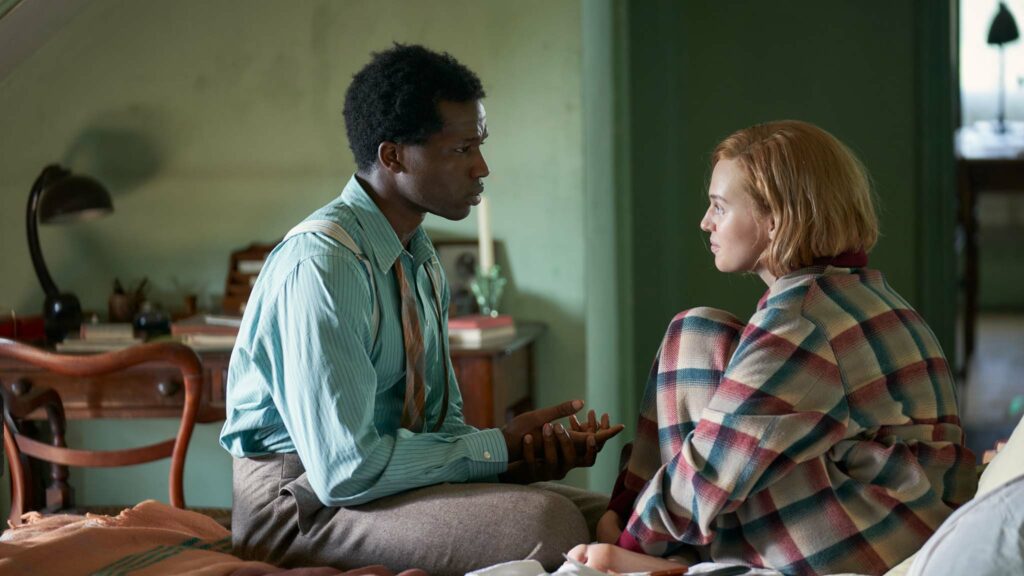Western
Cry Macho (12A)
Review: In his 39th film behind the camera – and, impressively, his eighth feature in the past decade – Oscar winner Clint Eastwood offers 15-year-old Mexican co-star Eduardo Minett sage advice on the qualities that maketh a modern man. “This macho thing is overrated,” growls the 91-year-old, who has embodied all-American masculinity on the big screen for more than five decades with defining roles as the Man With No Name in Sergio Leone’s spaghetti westerns, renegade cop Dirty Harry, and William Munny in Unforgiven. To prove the point, Eastwood spends the majority of this meandering drama, adapted by Nick Schenk and N Richard Nash from the latter’s 1975 novel, avoiding confrontations, whispering to horses and squinting his twinkly eyes at female co-stars.
Cry Macho is a tonally uneven and thematically familiar tale of clashing cultures, which trots along to the comforting twangs of composer Mark Mancina’s score. The plot is well-worn like Mike’s cowboy boots and dialogue frequently clunks louder than a pair of rusty spurs, resulting in performances that don’t always connect on a deep emotional level. However, Eastwood impresses in the film’s best, understated sequence, shedding a single tear beneath the shadowed brim of a cowboy hat as his cranky old coot relives the death of a wife and child in a car accident.
Rodeo star Mike Milo (Eastwood) retired from the ring after breaking his back and now trains “a string of second-rate horses” for rancher Howard Polk (Dwight Yoakam). Howard stood by Mike in his darkest hours and he calls in a favour, asking Mike to travel to Mexico to escort his estranged 13-year-old son Rafael (Minett) back to Texas. The rancher neglects to mention that two other men have tried and failed to chaperone the lad across the border or that ex-wife Leta (Fernanda Urrejola) is a venomous harpy living in heavily guarded splendour.
Mike wearily agrees and heads to Leta’s home. At first, she washes her hands of Rafael. “My son is wild, an animal who lives in the gutter,” she snarls, disclosing that the teenager makes money at illegal cockfights with his bird Macho. When she learns that Rafael is keen to leave Mexico and reunite with his old man, her attitude hardens towards the boy (“He’s my property!”) and she despatches henchman Aurelio (Horacio Garcia Rojas) to follow Mike and forcibly prevent the reunion.
Cry Macho saddles up for predictable intergenerational angst, punctuated by tender scenes between Mike and a widowed cantina owner (Natalia Traven). There’s no sense of urgency to the characters’ haphazard odyssey and conflict is resolved with risible ease. The titular bird adds flashes of unintended humour but, when Eastwood’s hero remarks that “this macho thing is overrated”, regrettably he could also be talking about his own picture.
Find Cry Macho in the cinemas
Romance
Mothering Sunday (15)
Review: Love across the class divide in the aftermath of the Great War unexpectedly adds to the list of civilian casualties in Eva Husson’s artfully composed period drama. Adapted from Graham Swift’s slim novel by Alice Birch, co-writer of Normal People, Mothering Sunday revels in the sexiness and sensuality of bodies entwined in urgent defiance of that most unforgiving mistress: time.
Odessa Young and Josh O’Connor gamely shed their inhibitions as the upstairs-downstairs lovebirds, raising the on-screen temperature several degrees with beautifully choreographed couplings that require matter-of-fact full frontal nudity. These rhapsodic scenes, concentrated into one fateful day in 1924, are visually ravishing and exert a strong emotional pull as conflicted characters try valiantly (and in vain) to conceal deep psychological wounds of the previous decade.
Swift’s lyrical prose – an orphan is told to count her blessings for being “comprehensively bereaved at birth” – translates elegantly through the compelling performances of the two leads and co-stars Colin Firth and Olivia Colman. Unfortunately, Birch’s script dissipates dramatic momentum by flitting between the intoxicating amour fou and two other timelines to examine the far-reaching consequences of this secret assignation. Glimpses of the future are insubstantial and Glenda Jackson is squandered in a fleeting appearance as the most mature and self-reflective incarnation of the heroine.
On March 30 1924 – Mother’s Day – tradition dictates that wealthy families give servants the day off. Mr Niven (Firth) and his emotionally brittle wife (Colman), who lost their two sons in the First World War, take leave of their mild-mannered housemaid Jane (Young) and cook Milly (Patsy Ferran) to spend the afternoon lunching at Henley-on-Thames. Milly catches a train home while Jane cycles to Upleigh, the sprawling estate of her secret paramour, Paul Sheringham (O’Connor). In two weeks, the prodigal son will marry socialite Emma Hobday (Emma D’Arcy), whose heart was promised to Paul’s older brother – another casualty of the conflict.
Jane and Paul spend precious time in carnal ecstasy, discussing the crushing weight of expectation on his shoulders as the surviving Sheringham boy (“I’ve got to get married, become a lawyer…”) and her fanciful dreams of becoming a writer. Their tryst is blissful yet brief because Paul is due at the riverside lunch with the Nivens, his parents (Craig Crosbie, Emily Woof), Emma and her parents (Simon Shepherd, Caroline Harker). When he leaves, Jane’s life of regimented service spins off its axis.
Mothering Sunday seduces our attention whenever Young and O’Connor trade whispered words and yearnful glances, then stumbles as time shifts and grief subsides. Cinematographer Jamie Ramsay conjures striking tableaux of physical intimacy, inviting us to linger with Jane and Paul in their bubble before it bursts and reality crashes in. Jane is mired in the past. For Husson’s picture, that’s a blessing.
Find Mothering Sunday in the cinemas
Musical
Tick, Tick... BOOM! (12A)
Review: In the early hours of January 25 1996, New York composer-playwright Jonathan Larson died from an aortic aneurysm, 24 hours before the first public preview of his musical Rent loosely inspired by Puccini’s opera La Boheme. He was 35. The show would transfer to Broadway, win four coveted Tony Awards including Best Musical as well as the Pulitzer Prize for Drama and inspire an ardent fanbase known as Rentheads. Another Tony Award winner, Lin-Manuel Miranda, creator of Hamilton, makes his feature film directorial debut with a big screen adaptation of Larson’s semi-autobiographical 1990 rock monologue about a composer struggling to gain a foothold in New York’s theatre scene.
Tick, Tick… BOOM! is a gushing love letter to Broadway and the creative minds who wring themselves dry in pursuit of a perfect melody and lyric. Scriptwriter Steven Levenson draws heavily on Larson’s work, recreating a 1990 stage performance as the framing device for cinematic flourishes. “Everything you are about to see is true… apart from the bits Jonathan made up,” quips Larson’s girlfriend Susan (Alexandra Shipp) in voiceover before the opening piano chords of “30/90” and Andrew Garfield unleashes his powerhouse vocals as the self-doubting talent, flanked by two singers (Vanessa Hudgens, Joshua Henry) and a band.
We follow 29-year-old Jonathan in the throes of an early life crisis, fearful that he will turn 30 without completing his rock musical Superbia. The last eight years have been poured on to the page and – crucially – he still lacks a barnstorming ballad for his heroine to usher in the show’s final act. Words of encouragement from idol Stephen Sondheim (Bradley Whitford) fail to allay Jonathan’s fears as he juggles tiring work shifts at the Moondance Diner in SoHo and long hours staring at the flickering screen cursor of his Mackintosh desktop computer.
Supported by dancer girlfriend Susan (Shipp) and best friend Michael (Robin de Jesus), who works in advertising, Jonathan chases his dream as the spectre of Aids casts a long shadow over New York, impacting their inner social circle including good friend Freddy (Ben Levi Ross). Time seems to be running out, for everyone.
Twenty-five years after Rent took its first bow, Tick, Tick… BOOM! detonates with palpable force on screen, turbo-charged by Garfield’s heart-wrenching central performance. His Jonathan is a heady cocktail of blinkered, infuriating, dazzling, resilient and defeatist and the Californian-born actor’s voice confidently crests the Larson songbook including a briskly choreographed duet with de Jesus on “No More”. The faltering romance between Jonathan and Susan treads water by comparison. Miranda is most comfortable with splashy song and dance numbers, particularly one euphoric cast rendition at the diner that disproves a character’s assertion: “Everyone’s unhappy in New York.”
Find Tick, Tick... BOOM! in the cinemas









